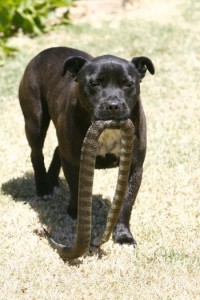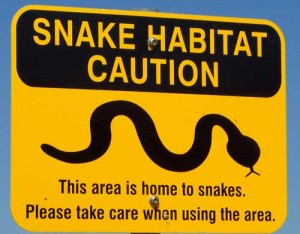These are first aid tips, please remember it is best to get your pet to the vet as soon as possible.
In Busselton, Dunsborough and Margaret River we are unfortunate in that we have several very deadly species of snakes, but on the plus side we have an anti-venom that contain antidote to the two most common species, so, unlike some other parts of the world it is not vital to identify the snake. Phew! Obviously trying to capture and identify the snake is very dangerous and should not be attempted.
Please call DEC Wildcare Helpline 9474 9055 (24hrs, 7 days), or go to their website if you need a snake captured and removed.
The snakes most often responsible for bites are:
- Brown Snakes – most commonly the Dugite (Pseudonaja affinis), less commonly the Western Brown Snake, or Gwardar, (Pseudonaja nuchalis). These snakes often live on farmlands and around towns.
- Tiger Snakes (Notechis scutatus) – lives on frogs and hunts at night, known to be aggressive. We have the Mainland Tiger Snake, the Black Tiger Snake and the Western Tiger Snake.
Other snakes we less commonly encounter are:
- Death Adders (Acanthophis) – stout snakes with a broad triangular head and short tail, they often hide in sand or leaves. Their colour is variable.
- Black Snakes (Pseudechis) – are not found south of Perth.
- Dilated pupils
- Drooling
- Diarrhoea, with or without blood
- Vomiting, with or without blood
- Increased (early) or decreased (late) body temperature
- Weakness, especially in the back legs and moving to the front of the body
- Change in v
 oice
oice - Brown or red discolouration of urine
- Generalised paralysis and death due to respiratory muscle failure
- Dogs may develop signs immediately after being bitten and then apparently recover for a variable period of time, usually less than 60 minutes. These signs may be collapse, yelping, drooling, urinating, vomiting, defaecating, trembling or panting – known as pre-paralytic signs. If these signs occur in your dog he/she has received a large amount of venom and must be brought to the clinic as soon as possible.
If you suspect your dog or cat has been bitten by a snake:
- Do NOT leave your pet alone, severe clinical signs can occur very suddenly in a short period of time
- Keep your pet as calm and still as possible, the venom will be spread faster if your pet is excited and active
- Ensure your pet is breathing, if not perform CPR
- Take your pet to the nearest vet as soon as possible
- You have directions to our clinic and our phone number 9755 4455
- If possible call us on the way so we can be expecting you
- You drive safely!

